
|

|
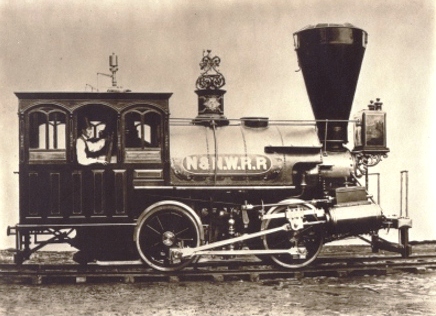
BURNS, TN
Until the mid-1860s, life in this region was isolated, with access to cities limited to horse-drawn vehicles traveling
rough roads. At the outbreak of the War Between the States, the Nashville and Northwestern Railroad had completed its line
only as far out of Nashville as the Harpeth River at Kingston Springs. After General US Grant was given command of the Grand
Army of the Republic in March 1864, one of his first actions was to order the Union Army to complete the railroad from Kingston
Springs to the Tennessee River in order to provide a secure route for supplies into Nashville, Chattanooga and points beyond.
The settlement established here was first called “Mile Post 36,” indicating its mileage from Nashville. During
the war it was inhabited by Union soldiers and railroad workers. In 1866 Yankee carpetbaggers began to relocate to the area.
John McClelland, the first postwar postmaster, was a federal appointee described as an “ambitious politician seeking
to share in the spoils of war.” The first post office opened on June 27, 1866.
Soon after the War, the Nashville
and Northwestern Railroad took over the rail line from the Federal government and Mile Post 36 was renamed Burns Station in
honor of the President of the Nashville and Northwestern Railroad. Over the years the “Station” part of the village
name was dropped, although Burns retained its depot and was a regular stop on the railroad until about 1970. The depot was
converted into Burns’s first Town Hall. The first meeting of the Town Council was held April 6, 1953. Postwar
Burns was a thriving town with general stores, mills, saloons, blacksmith shops and several other businesses.
| Provost guard 107th Colored Troops, U.S. Army |
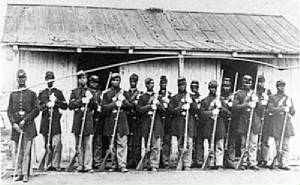
|
| Source: United States Army Military History Institute |
Ten thousand blacks built the Nashville and Northwestern Railroad west
from Nashville to the Tennessee River http://www.bonps.org/usct031804.htm
***********************************************************
Alexander DuVal McNairy -
3rd Lt., Company B, 20th Tennessee Infantry. "He commanded
a company of independent scouts known as the "Swannee Rifles" and fought at Fishing Creek and Shiloh; they later organized
a battalion of partisan cavalry, which operated behind Union lines in Tennessee. They operated between the Cumberland and
Tennessee Rivers in Tennessee during 1862 and 1865. He was considered the terror of the Federal Army. His gang specialized
in the harassment of railroad workers. On 18 Oct 1864 the track workers were captured by McNairy and his men between Smeedville
(now Dickson but originally named for railroad surveyor E. C. Smeed) and White Bluff. Three days later the bushwhackers burned
all the dwellings and worker's huts on the railroad." ("Ghosts by Daylight" 1893).
http://patriotspage.duvalfamilyassociation.com/dmcnairy.htm
***********************************************************
“Our Trip over the Northwestern Railroad.”
But a few weeks since, just after the completion of the
Northwestern Railroad, connecting the capital of Tennessee with Hickman, on the Mississippi, General Superintendent Innes
invited attaches of the several daily papers of this city to accompany an excursion train over the road from Nashville to
its western terminus. Owing to the shortness of the notice, and the multiplicity of duties devolving upon all hands in the
office, the Press and Times was not represented on that occasion. Finding a little spare time last week, we concluded to take
a ride over this road, as much to see the country along its line, as to get a respite from the din and bustle of city life.
Early
on Thursday morning we proceeded to the Chattanooga depot, along side of which the train bound West was waiting all who might
present themselves as passengers. The sky was clear, and the air quite cool. In fact, there was a heavy frost, the first we
has seen this autumn, not only tangible, but visible. At 6 o'clock the stentorian voice of the conductor sang out “all
aboard,” when the train slowly moved off, drawn by engine No. 18, otherwise known as the “Gov. Brownlow.”
Soon we had traversed that part of the road on stilts over the “lick Branch,” not far above where “the said
Hood” played “possum” to the “Injuns,” and lost his scalp, and were rapidly approaching that
outer line of battlements, the city soon faded away in the distance, when we found ourself [sic] indeed in the country, breathing
its pure air, and enjoying its sublimer scenery – its hills and valleys, fields and forests. “Man made the city,
God the country.” Therefore, dear reader, if you be a dweller in the country, repine not at your lot, for “rural
felicity” is preferable to the crowded city, with its heartless indifference, its fashion and vanity, stench and dust.
Six
and a half miles out, we passed at Bellemead, the first stopping place after leaving the city. Then away we go through that
beautiful section of country, so highly improved and so desirable, embracing a model stock farm of Gen. Harding, with its
grassy; lawns and stone fences, it comfortable mansion and convenient appendages.
Now we are ten miles out, at Vaughn’s
Gap. Another pause, and away we go, through hill and valley, over creek and ravine, passing Bellevue, Smith’s Mills,
Newsom, Pegram, Palmer’s Mills, Kingston Springs, Glendale, White Bluff, Burns, Smeedville, McCall, Gillem, McEwen,
to Waverly, the county seat of Humphreys county, and sixty-six and a half miles from Nashville. Waverly, though a railroad
town, looks rather dilapidated and has been sadly neglected by the painter. It boasts three brick buildings, court-house,
church and academy: so we may reasonably infer that the good people of Humphreys are not forgetful of these three cardinal
duties – the administration of justice, the worship of God, and the “teaching the young idea how to shoot.”
[sic] * The “White House,” where the up-train passengers take dinner, is a new establishment, and furnishes just
such meals are hungry mortals are glad to get. Jimmie Noland, the kind and attentive manager of the house, has out thanks
for favors extended us. After the delivery of the mails, a small accession of passengers, and away we roll for forty minutes,
when we “fetch up” at Johnsonville, environed on one side by barren sand-hills [sic], and on the other by the
Tennessee river. It is seventy-eight miles from Nashville, is a railroad town which sprang up during the war, and was named
after the “Alderman of Greeneville,” “one of the immortal thirteen,” the then Military Governor of
Tennessee, but now His Excellency the President of the United States. Johnsonville enjoys not only railroad facilities, but
is accessible by steamboats from the upper and lower Tennessee, and was a great depot for Government stores during the rebellion.
We asked a disciple of Roger Sherman the population of the place. He though not more than four hundred! We replied we thought
not. Perhaps, including black and white, dogs and all, the number may be two hundred. The “Johnson House, the principal
hotel, (and we observed several others,) stands just opposite the depot, perched on a hill side, about as high above the train
as a country martin box above a chicken coop. We know nothing of the house, but saw at least one attraction – “the
girl with the blue dress on,” but what “de white folks calls her,” deponent sayeth not. Just at 10 o'clock
the unbound train came by, giving us the track below, and in a few minutes we had quit Johnsonville and were moving slowly
over the Tennessee river bridge, a Howe Truss, a most excellent structure about five hundred yards long, and connecting Middle
with West Tennessee. From the bridge we had a fine view of the river above and below, and we thought to ourself [sic] how
great the change since old man Donelson and his fellow voyagers passed here, on their way from their settlements in East Tennessee
to the “Bluffs” on the Cumberland, to found a habitation in the wilderness, of which Nashville is the legitimate
offspring. What changes, what transformations, what developments have been made in eighty-five years!
It was here,
too, that we saw some dozen or less hulks of boats, said to have been destroyed during the war by the rebel General Forrest.
Over
the river, the road now leads through the Tennessee bottom, densely crowded with timber, and in some places through swamps
studded with cypress knees and other growth. On, and on we go passing Willston, Camden, Hollow Rock, till the breakman cries
out, Huntingdon! When we take a bird’s-eye of the capital of Carroll, one of the oldest looking towns in West Tennessee.
It too, has been quite neglected by all the mechanics: mason, carpenter and unpainted. However, should the talked of railroad
be constructed, connecting with Jackson, Tennessee, and thus forming a nearly direct line of railway from Nashville to New
Orleans, Huntingdon will yet see better days. It seems to us that this is an important link, and that railroad men will not
long delay its construction.
From Huntingdon we move on, stopping at Hico, a minute, to McKenzie, the point where the
Memphis and Ohio and the Nashville and North-Western railways intersect each other; and also the dinner stand for the down
trains, distant from this city one hundred and nineteen miles. The dinner was good, and the clerks are quite attentive, especially
to the collection of bills. They do a safe business at this house, requiring passengers to pay in advance, acting upon the
precaution couched in the homely couplet:
“Since man to man is so unjust!
We do not know what man to trust.”
All
the seats were filed with busy occupants, none engaging in conversation, except a couple of wise-acres who talked knowingly,
and related many things that “I did.” Mr. Pomposity has speculated in grain, investing some $8,000; and had all
dealings with some “big house,” whose acquaintance he had formed through the “First National Bank!”
What a happy medium through which to form acquaintances! A descendant of Abraham though the best way to make money now, was
just to do nothing at all. He may be half right – don’t know. He vowed up by saying, “all whiskey distillers
and large dealers are d____d rascals!” He knew “all about it.”
Here too, we took leave of a number
of passengers, among them a couple who had talked much on the way down. One was an official of some West Tennessee County,
and the other had wanted to go to Congress. He talked much; expostulated with the Sheriff about the innovations of his party;
would suffer much; but before he would suffer a party to elevate the negro above him and his disfranchised friends, he would
resist by any and all means within his power. The Sheriff admitted that there were some things which he did not approve, but
thought they would adjust themselves after awhile, and all things would again move on smoothly. Although Maury has the lucky
man, we confess Humphreys has the best looking man. We trust Mr. Arnell will take no exception at our decision as to the relative
beauty of himself and his handsome competitor.
But the Louisville train has come and gone, and so away we go to Gleson
[sic], and then on to Dresden, the capital of Weakley county, and a pleasant looking town at that. From this [point] on, the
soil becomes better and better, and the towns and country residences wear a more pleasant appearance. Again we move on, stopping
at Ralston, Gardiner and Raccoon, to Union City, in Obion county, where the Mobile and Ohio crosses the Nashville and Northwestern
Railroad, and from which place the New Orleans and Ohio railroad runs to Paducah, at the mouth of the Tennessee. These last
named town are all new, and the latter promises much for the future, as a railroad point.
Leaving Union City, we move
rapidly on, passing the State line, and a few minutes bring us to Hickman, in Fulton county, Ky., on the Mississippi, one
hundred and seventy miles from the capital of Tennessee. Hickman is a new and thriving town, with a population variously estimated
at from 1,500 to 2,500, and is located on a high and irregular bluff, overlooking the great “Father of Waters.”
As to its probable future, we of course know but little. It appears to us to be the most direct, as well as the cheapest and
speediest, route of transit for freights from New Orleans, St. Louis and other points, North and West, to Nashville. Should
the Nashville and Northwestern Railroad some day change its western terminus to Columbus, Ky., to Pilot Knob, there connecting
with the St. Louis and Iron Mountain road to the city of St. Louis, then Hickman would lose much of its importance, and would
doubtless do but little business.
The Nashville and Northwestern Railroad, from this city to Johnsonville, a distance
of seventy-eight miles, is an excellent road, having good ties and ballast. From Johnsonville to Hickman the road is good,
but being new and for the most part without ballast, it is not in as excellent condition as the Eastern Division.
The
completion of the Nashville and Northwestern Railroad, which occurred in the month of August last, has given to our city a
most valuable avenue of communication, which will grow in importance as time advances.
The uniting of the Capitol of
Tennessee with the Mississippi will prove in time, of great moment in the direction of trade and commerce.
The road
connects South and West, with the Illinois Central to Chicago, the Iron Mountain road to St. Louis, the Memphis and Ohio to
Memphis, and the Mobile and Ohio to Mobile and New Orleans. The road is in the hands of excellent officers, and every day
adds to there business with it transacts. Connecting as it does, the Middle with the Western portion of the State, it is destined
to become one of the most important and successful avenues of communication. We commend the road to the attention of the business
and traveling public.
Nashville Press & Times, October 30, 1867
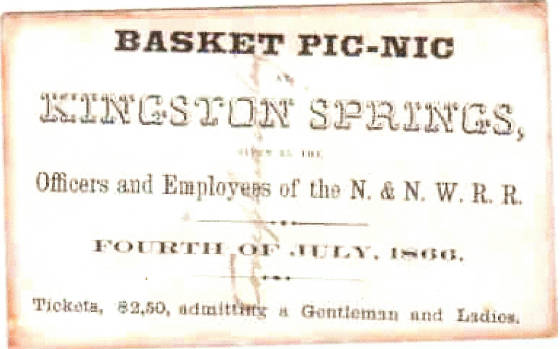
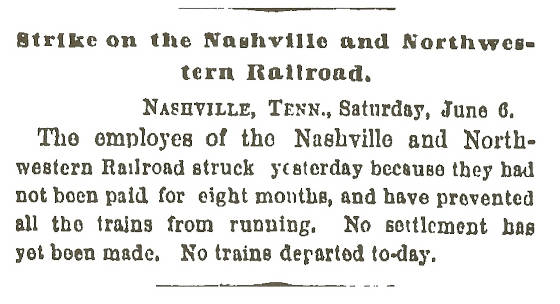
|
| THE NEW YORK TIMES JUNE 8TH, 1868 |
|

|

|

|

|

|
| Nashville & NW RR President Michael Burns |
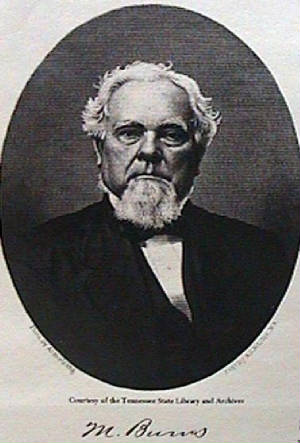
|
| Courtesy of the Tennessee State Library and Archives |
MICHAEL BURNS, the subject of this sketch, was born in County Sligo, Ireland, in the year 1813,
and died in Nashville,
Tenn., July 14, 1896. His parents were in comfortable circumstances, and
were able to give their children a fair English education. He was the eighth in number of ten children. At the age of nine
years he was left an orphan. At the age of fifteen he was apprenticed to the saddlers' trade. In 1831, Mr. Pool, the saddler
to whom he was apprenticed, immigrated to Canada; he went with him and
completed his apprenticeship at Montreal, Canada.
After this he came into the States, spent some time in New Haven, New
York and Pittsburg, working at his trade, and he finally arrived in Nashville, Tenn.,
in 1836. Here, with but little money but with an abundance of youthful energy and ambition, he commenced that career which
has made him one of the best known and one of the most respected citizens of the community. His industry and integrity were
rewarded by the accumulation of wealth and positions of honor and trust. In 1842 he was married to Miss Margaret Gilliam,
the daughter of Wm. Gilliam, a queen’s ware merchant of Nashville, who was lost on the steamer Arctic in 1854 when on her passage from Liverpool to New York. Mrs. Burns was a wife who sympathized with her husband's ambitions and lovingly
ruled and governed the home, while he made the battle of life in the commercial world. Through their joint efforts they succeeded
in making prosperity a fact. Mrs. Burns died in 1885. In 1853, on the accession of Andrew Johnson to the governorship of Tennessee, Mr. Burns was made a director in the Bank of Tennessee,
that institution being under the presidency of Hon. Cave Johnson. The confidence thus bestowed by Governor Johnson in the
appointment of Mr. Burns was never afterwards withheld, but increased as that extraordinary man advanced in station and influence.
Mr. Burns was chosen by the president and his colleagues to manage the affairs of the bank in its connections
with financial institutions in northern and eastern cities. Negotiations involving millions in amount were entrusted to his
care, and these were conducted in so quiet, sagacious and systematic a manner as to merit the warm approval of his colleagues,
though his skilful labors in that respect were hardly known or mentioned out of the directors' room. Mr. Burns was six years
in this important trust, retiring with his colleagues upon a change in the state administration.
Soon after he was elected a director in the Union Bank of Tennessee,
and remained such, with an exceptional interval of two years, until its liquidation. During this time Mr. Burns was in the
directory of the Nashville & Chattanooga railroad, which was completed
in 1854, and in that of the Nashville & Northwestern, which was in process of construction.
Mr. Burns' connection with the railroad interest of the state was prominent, meritorious and as
honorable as that held by him in its fiscal institutions. At the outbreak of the Civil war he was vice president of the Northwestern
railroad, then only completed twenty-nine miles westward from Nashville,
together with twenty-five or thirty miles west of the Tennessee river (the latter portion was destroyed by the ravages
of the contending armies subsequently and the iron carried off), and on the occupation of Nashville by
the Federal forces, the president being without the military lines, he assumed charge of the interest and property of the
company. His first step in that emergency was to prevent its rolling stock from being carried to the South and beyond its
control, as the property of the Nashville
& Chattanooga railroad had
been by order of the retreating Confederate authorities. With this view he promptly ordered it to be taken to the terminus
of the road, whence it was subsequently returned to the city of Nashville by the Federal authorities. It was through his instrumentality that the Nashville
& Northwestern road was constructed during the Civil war to the Tennessee River,
becoming as it did during that distressful period a source of great relief to the people. This important object was secured-
by Mr. Burns in the following manner: The Louisville & Nashville railroad was during
a considerable portion of each year the chief reliance of the Federal forces for connection with their base of supplies, and
was frequently attacked and destroyed at various points by the Confederate cavalry. At these times heavy requisitions for
supplies were made upon the people. To avert this oppression Mr. Burns presented to Military Governor Johnson the importance
to the Federal government of another route, and prevailed on him to consider favorably the building of the Northwestern road
to the Tennessee River and obtained from him a letter to President Lincoln. Armed with this, which contained a high endorsement
of Mr. Burns' character and business energy, he went to Washington
City and was enabled to secure an immediate hearing and successfully
impressed the president with his views, who gave orders to the secretary of war for the building of the road projected. The
cost of that portion of this important branch of railway was more than $4,000,000, all of which was paid by the Federal government.
Not a dollar of this amount was paid by the State of Tennessee,
or afterwards required of it, and this gift was directly due to Mr. Burns' efforts. At the end of the Civil War the Northwestern
road was turned over to Mr. Burns, and in an hour's time after receiving the official notice he had a train running on the
road. By this promptitude the road was securely acquired for the company, and under Mr. Burns' energetic administration was
completed to the Mississippi river. The railroad history of the state records no more efficient and salutary service than the skillful management of the Northwestern
road under Mr. Burns' direction as its chief officer, from 1861 to September, 1867. The committee of the legislature of 1870,
which carefully investigated the condition of the railroad enterprises
of the state, made the following report in regard to the Northwestern road: "At the time said road was turned over to Mr.
Burns, in September, 1865, of the ninety-eight miles west of the Tennessee River only about fifty had been constructed, and
that had not been operated for years. The iron had been torn up by the United
States authorities and removed from about thirty miles of the route. The embankments had
washed, cuts caved in and cross-ties rotted, as well as all bridges and trestles of every kind; and that part which
was left had grown up in wild growth, so that it was as costly and difficult to rebuild that portion of the road which had
been built as that which had never been touched. The committee here beg leave to call attention to the economical manner in
which Mr. Burns, as president of said company, husbanded the small means at his disposal for the construction of the said
ninety-eight miles of road, to which must be added the immense bridge over the Tennessee river; and the committee deem it
but just to Mr. Burns also to commend the dispatch with which said herculean task was accomplished. Ninety-three miles of
road built in eighteen months, with a bridge over the Tennessee river, is a feat the like of which is not often performed
in building railroads, and is not only in happy contrast with the tardy progress made by his predecessors and others who have
undertaken the construction of railroads; it also compares favorably with the rapidity with which the great Pacific was built."
On the 15th of September 1865, a few months after the close of the Civil war, Mr.
Burns then being president of the Nashville & Chattanooga Railroad, the
property was surrendered by the Federal government to the company. Its treasury was emptied, its track almost worn out by
the severe use and casualties of its military management for nearly four years, and its depots and bridges dilapidated. An
immense outlay was necessary to restore it to a proper working order. Laboring under every variety of disadvantage, the management
was called upon to disentangle the confusion into which its affairs had fallen with the military authorities of the general
government, and to emancipate it satisfactorily from that control. Mr. Burns' personal relations with President Johnson, whose
confidence and friendship he enjoyed in a marked degree, enabled him to effect the extrication of the Chattanooga road from
its complications with the Federal government and its restoration to the stockholders, and his successful administration for
three years accomplished its entire reinstatement as the pioneer, and in many respects most important, line in the Tennessee
railway system. The period of his presidency was one of unusual difficulty. In a region suffering from
the impoverishment caused by the war, and in a period of general prostration, its affairs were skillfully administered, the
road was reconstructed, not an accident occurring to life or limb. Mr. Burns resigned the presidency of the company Aug. 10,
1868. The following is a copy of a letter given to Mr. Burns by Military Governor Andrew Johnson as an introduction to President
Lincoln:
State of Tennessee, Executive Department,
Nashville, Tenn.,
June 14, 1864.
Dear Sir: I have the pleasure of commending to your consideration my old friend, Michael Burns,
of this city. Mr. Burns is a gentleman of high standing in the city, and of rare business qualifications. He is the president
of the Nashville & Chattanooga
and the Northwestern railroads; and by his energy, skill and capital has contributed largely to the successful progress of
the latter road, which, as you are advised, is now in running order to the Tennessee River.
The government owes him much for his hearty co-operation with the secretary of war and others in constructing this great military
and commercial enterprise, by which we can soon be relieved of the exacting extortions of the Louisville & Nashville
road; and all the troops and munitions of war can be transported over a much shorter, cheaper and more secure, and at all
seasons certain line to this point. Mr. Burns visits Washington
on important business, which he will lay before you, and any assistance or kindness you may be pleased to give him will be
heartily appreciated and conferred upon an esteemed and worthy gentleman. I have the honor to be, with great regard, your
obedient servant. Andrew Johnson.
Abraham Lincoln. President of the United States.
(endorsed) Hon. Secretary of War: Please see and hear the bearer, Mr. Burns.
A. Lincoln.
Aug. 3, 1864.
In 1870 Mr. Burns was called to the presidency of the First National bank, of Nashville. Tenn., and that position he held for eight years, where he displayed
the same ability and integrity that he had shown in the management of railroads. After his resignation
of the presidency of the First National bank he was twice called upon and elected as representative from Davidson
County to the state legislature as senator from Davidson County. After the expiration of the
term of his last election to the state senate he withdrew from all participation in public affairs. In religion he was a Roman
Catholic; in charity he knew no creed. The key to his success was his laborious application to business, coupled with his
well known honesty.
From Notable Men of Tennessee, Vol. 1 pgs 77-82 Southern Historical
Association 1905 Atlanta, GA
NASHVILLE & NW RAILROAD
This road connected Nashville with the Tennessee and Mississippi Rivers. It was chartered in 1852 and was complete from
Nashville to Kingston Springs, Tenn. when the war started (24 miles). Another section was complete from Hickman, Ky (on the
Mississippi River, just above the Tennessee border) to McKenzie, Tenn. (55 miles) The Union Army extended the eastern section
from Kingston Springs to Johnsonville (on the Tennessee River) to get around the problem of low water in that river.
Captain Cross's Guerilla Company
CAPTAIN ALBERT HENON CROSS'
TENNESSEE CAVALRY COMPANY C.S.A.
Spence's
History of Hickman County says a number of men from Hickman County served in this company which was organized by Captain Cross,
of Davidson County. A. Duval McNairy, also of Davidson County, was listed as 3rd Lieutenant. No muster rolls of the
company were found, but there were several references in the Official Records to attacks by McNairy's Guerrillas on the line
of the Nashville and Northwestern Railroad in 1864. In early 1865, Captain Cross, signing as Cross' Company, Harvey's Battalion,
Forrest's Scouts, had some correspondence with the Federal Authorities which led to his surrender at Franklin, Tennessee,
on May 15, 1865.
http://fp1.centurytel.net/Guerillas/captain_cross.htm
| A. Duval McNairy |
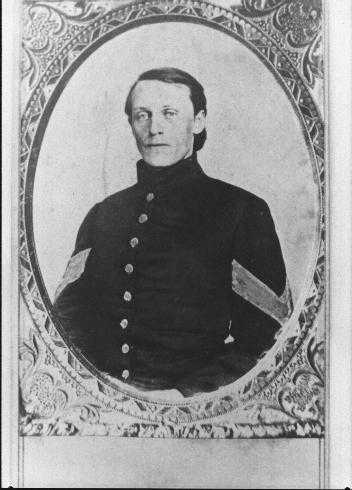
|
| Confederate Guerilla & N&NWRR Terror |
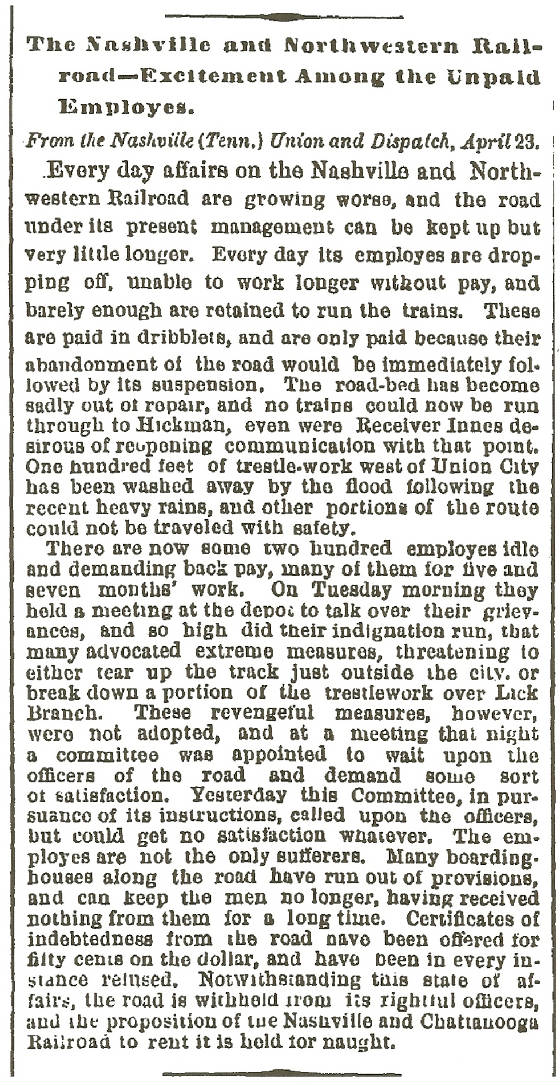
|
| THE NEW YORK TIMES APRIL 30, 1868 |
|

|

|

